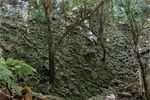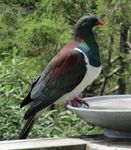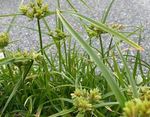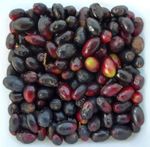Gorge Gazette - Trelissick Park
←
→
Page content transcription
If your browser does not render page correctly, please read the page content below
Gorge Gazette
News about Trelissick Park, the Ngaio Gorge and Streams
Abbreviations:
WCC Wellington City Council TPG Trelissick Park Group
GW Greater Wellington Regional Council DOC Department of Conservation
Website www.trelissickpark.org.nz (includes past Gorge Gazettes and Park map)
Facebook https://www.facebook.com/TrelissickParkGroup
FEBRUARY 2021
An Avian Invasion – Eva Durrant
They came in from the north and east forming a flock of
over 50 in the centre of Trelissick Park shaking the tree
branches into constant movement. This wasn’t a flock of
small birds but one of our largest, the kererū. I did not
know we had 50 kererū in the area but they put on quite
a show recently in one of their annual flocking events.
[Eva and Barry Durrant’s house overlooks the lower
Kaiwharawhara valley and they delight in witnessing the
increasing bird life].
Why?
Tawa and karaka trees, probably. They grow
everywhere in the lower Kaiwharawhara valley.
DOC says that ‘since
the extinction of the moa,
the kererū and parea are Photo: Bill Hester
now the only bird species
that are big enough to swallow large fruit, such as those of karaka,
miro, tawa and taraire, and disperse the seed over long
distances.’
Peter Reimann’s tawa tree above Heke Reserve nearby is
laden with more seed than ever seen before. The ice-cream
container in the photo, 1/3 full, is only a small sample. They are
now planted in a seed tray, optimistically.
Good enough to eat?
Why Also?
The wonderful bird life now in Wellington no doubt mainly comes from the Zealandia ‘halo effect’
and ardent predator control groups throughout the suburbs.
Everything about predators, predator control and TPG volunteer efforts is on our website,
maintained by Bill Hester, see http://trelissickpark.org.nz/predators.htm. This includes reports,
guidelines, maps, illustrations, a night video of some rats in action and the surprising results of a
study of animal intruders using motion-activated cameras. A mine of information.
Wellington is also a uniquely ‘bushy’ city with its parks and reserves, green belts, bush
corridors, and backyard trees. How lucky we are to live in such a paradise! The birds think so
too. But inexorable urban development is a worry.
At the Coalface
New Seats with Commanding Views – WCC replaced the old bench below the Trelissick
Crescent entrance opposite #19. It is in memory of Captain Peter Attwood, who used to
regularly walk his dog in the Park. Barry Durrant installed a seat next to the Hanover Street
entrance, made by Peter Radcliffe.
1KiwiRail’s New Ferry Terminal at Kaiwharawhara – KiwiRail are canvassing views of interested
parties, including TPG, who are keen to enhance the estuary (part of the ecological corridor).
New Park Map – See our website home page. WCC updated John Foden’s original map to
show the new track from Oban Street and the new Kaiwharawhara Stream bridge #7.
Northern Walkway Upgrade – This year WCC are working on the section below Hanover Street
down to the stream.
Summer Releasing – With alternating bouts of sunshine and rain, the weeds are most
enthusiastic. Treasury, Conservation Volunteers, St Benedict’s School, SPCA staff and our
working bee volunteers came to the rescue. The Wellington Interfaith Council and Sathya Sai
Service Organisation cleared around their 51 trees to commemorate the victims of the mosque
shooting. Tim McIvor has taken on the eastern half of the Trelissick Crescent verge. Lea and
Hugh Robertson cleared some tradescantia from the slope above the debris trap. Anne Tuffin
and Joan Waldvogel continue their work on the slopes below Hanover Street. Finn Illsley-Kemp
has a spot downstream of bridge #7.
Fish Ramp at Kaiwhawawhara tunnel exit – Slip debris is being cleared by Jim Gifkins.
Weed-eating and Debris Trap Clearance – By Peter Reimann and Warrick Fowlie respectively.
Scroll through our Facebook page for photos.
A Bit of a Puzzle
The photos show the
Kaiwharawhara Stream tunnel
entrance and lower part of the
embankment below the
Johnsonville railway line,
taken from Churchill Reserve.
Before the railway was built in
the 1880s, the stream would
have flowed to the left of the
tunnel.
The engineers must have
been faced with three options
to get the railway, 30 – 40
metres aloft, across the
stream:
1. Build a bridge (a major and
expensive structure).
2. Construct a long culvert (in
brick) over the stream, then
build an embankment above
(but the stream bed is subject
to erosion, flooding and
change.
3. Tunnel through the adjacent
rock to divert the stream, then
build an embankment over the
original stream bed.
Option 3 was the obvious
choice. There was also plenty
of tunnelling expertise at hand,
given the tunnels built on the
line up to Johnsonville.
Note the old stone lining to reinforce the side of the Does anyone have any
embankment. Photo: Lynne Pomare history of this area?
2Marilyn’s Enemy
Cyperus eragrostis, (umbrella sedge) no less.
‘Adventive’ in botanist’s parlance. Marilyn Hester
has eliminated it while working around the
Trelissick Crescent verge, and (with permission)
from among the landscaping grasses in front of
the Ngaio Union Church.
She says that being a sedge, it thrives in
riparian conditions and is invasive. Unfortunately,
there is no shortage of this plant along flat areas
beside the Korimako Stream.
Photo: watershednursery.com
Modern Art
For the connoisseur, the lower Kaiwharawhara valley is unrivalled. Here are two fine examples:
Midway up Ngaio Gorge Road – soon to be It is worth walking through the tunnel (below the
concealed by the planting. oil tanks) to view more wall adornment.
Working Bees
See website 'Projects' page for dates, locations and health and safety information.
Contacts
Peter Reimann (04) 938 9602, nz.peterreimann@gmail.com
WCC (reporting problems) (04) 499 4444 or
https://forms.wellington.govt.nz/s3/Council-Fix-It-Contact-form
GW pollution hotline 0800 496 734
Thanks to all our volunteers, supporters and staff from WCC and GW.
Membership drawn from Highland Park Progressive Association Inc., Ngaio Crofton Downs Residents’ Association
Inc., Onslow Historical Society Inc., Private Landowners’ Group, Royal Forest and Bird Protection Society Inc.
(Wellington Branch), Wellington Botanical Society Inc., Wadestown Residents’ Association.
3You can also read
























































